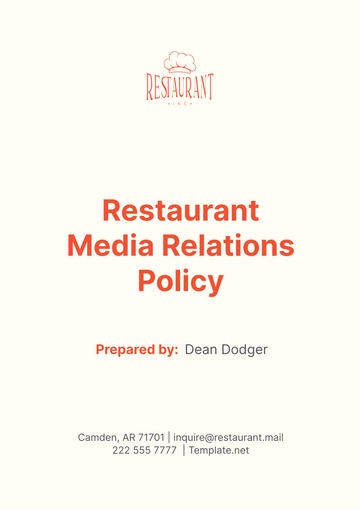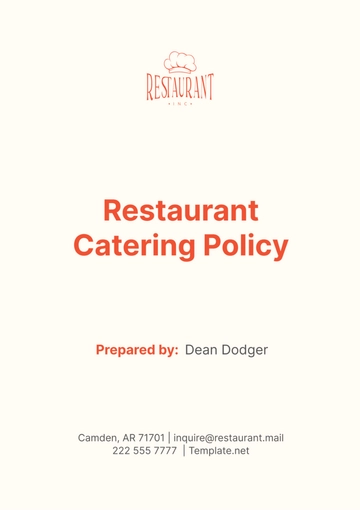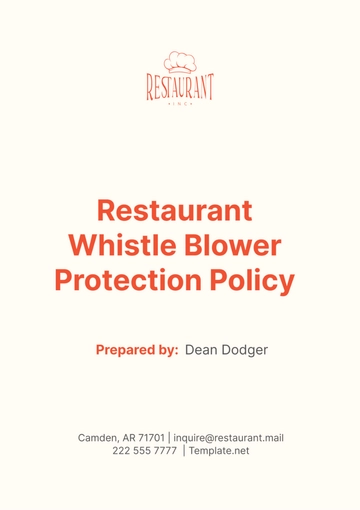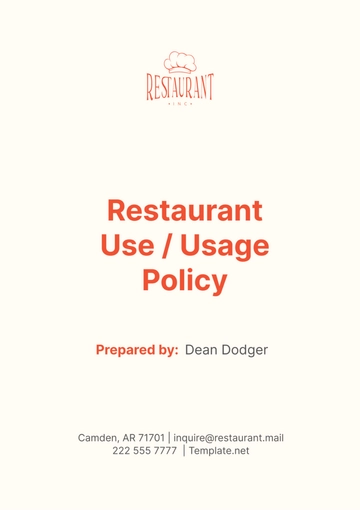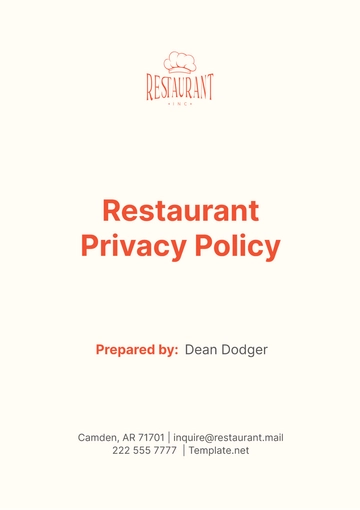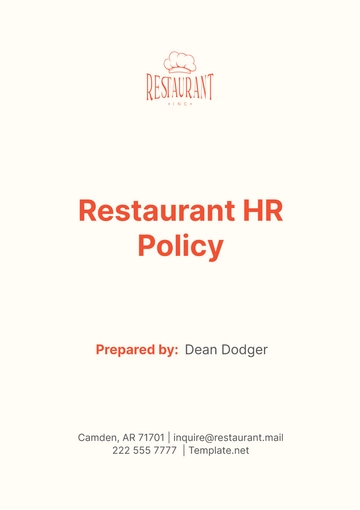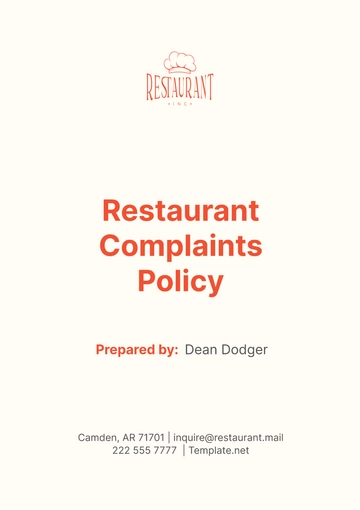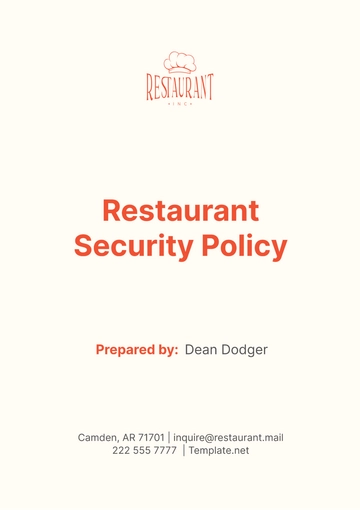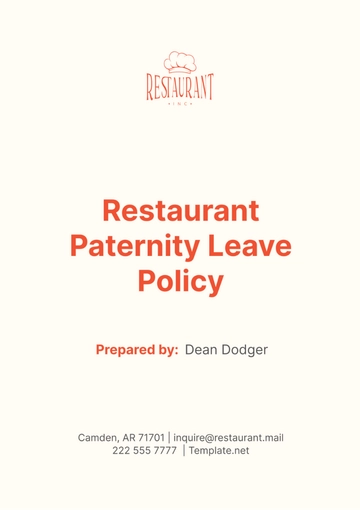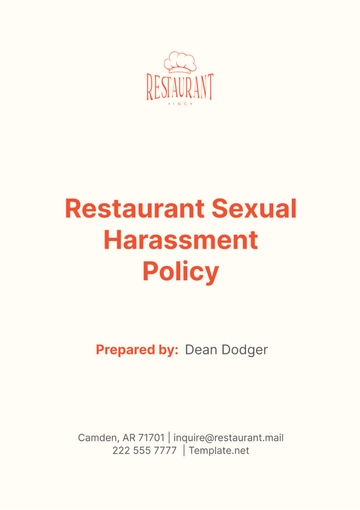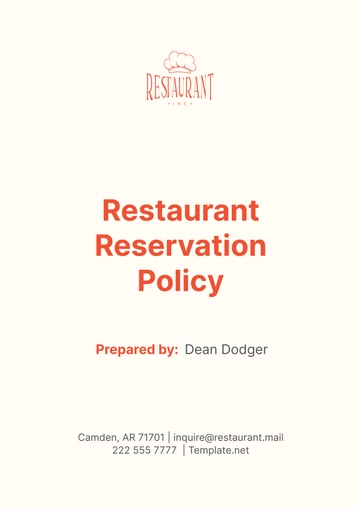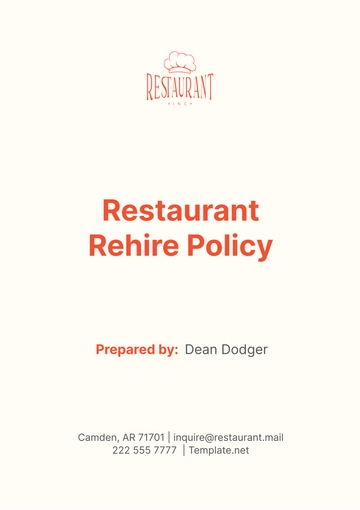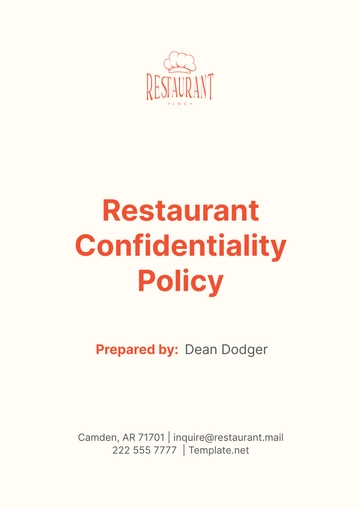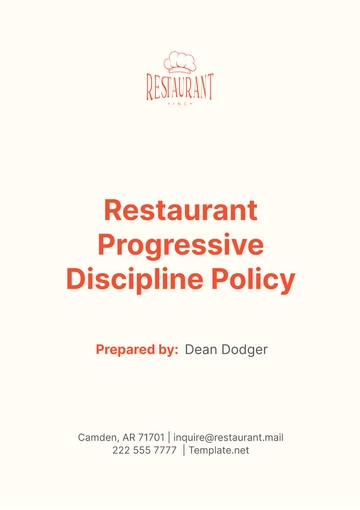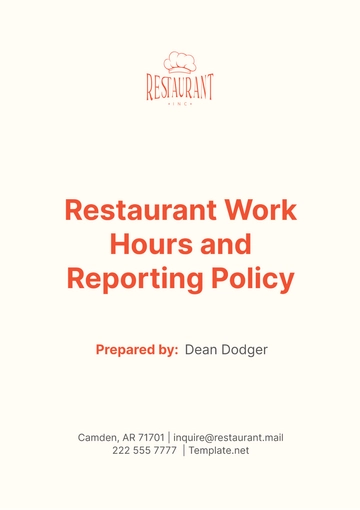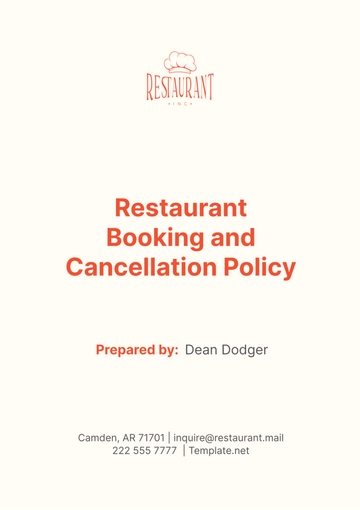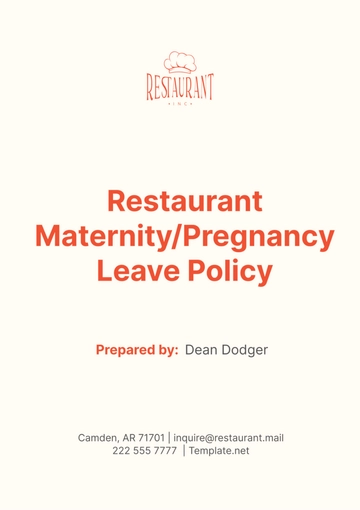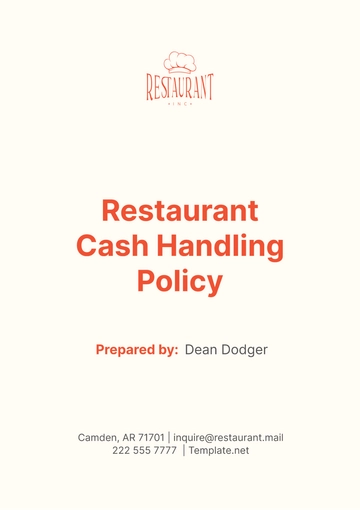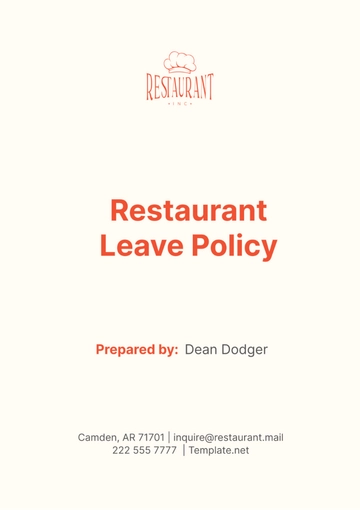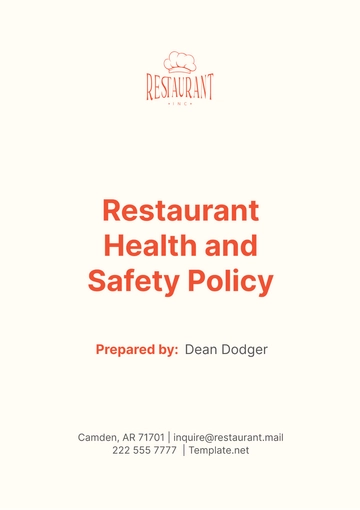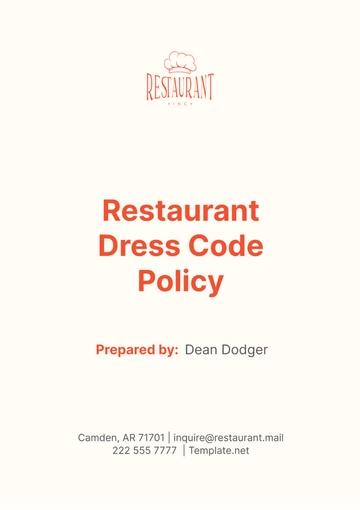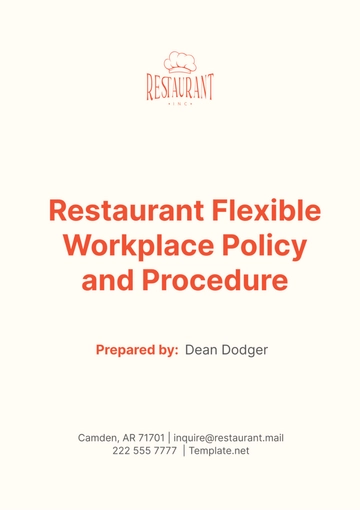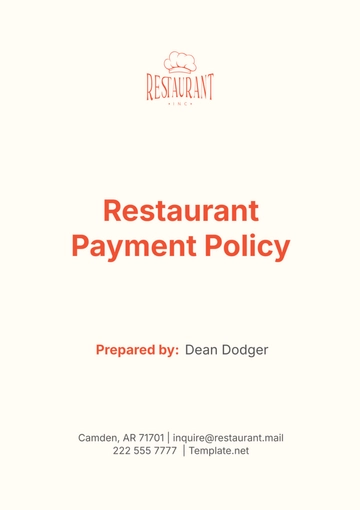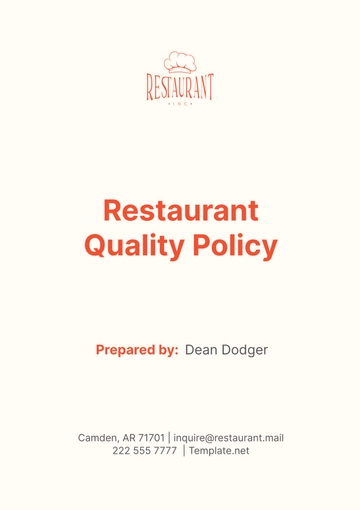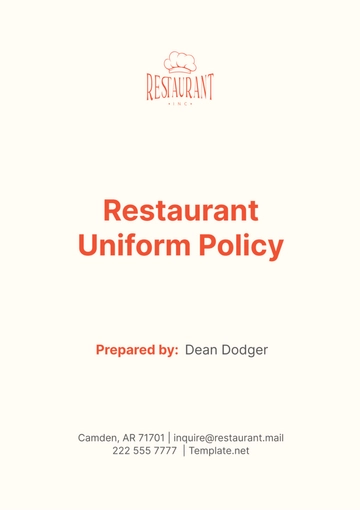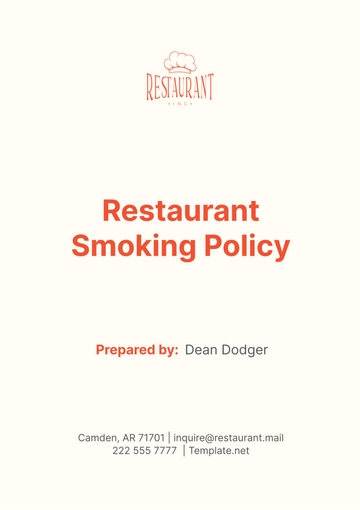Free Restaurant Attendance Policy
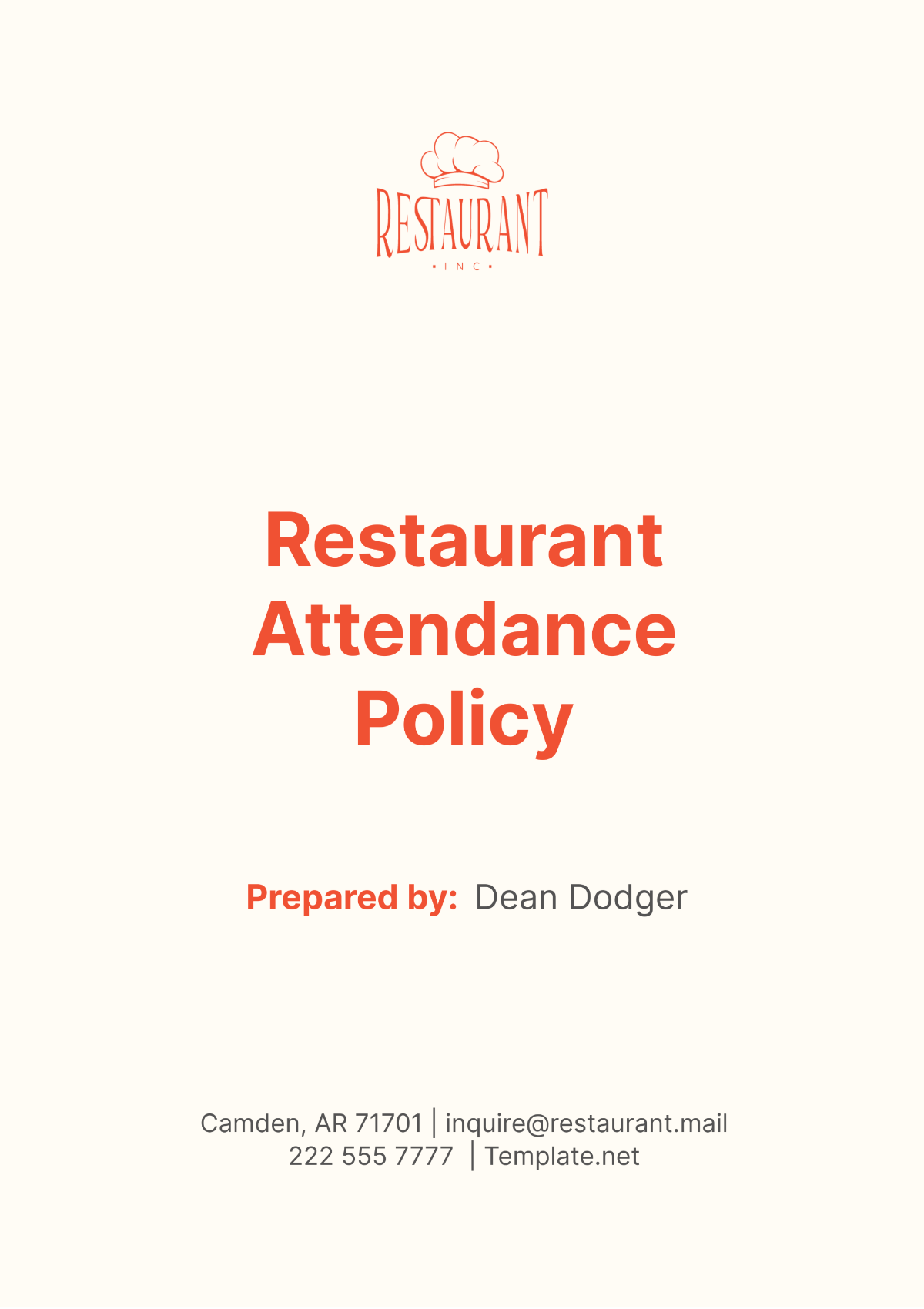
This Restaurant Attendance Policy, established by [Your Company Name], is designed to set clear and consistent attendance expectations for all restaurant staff to minimize disruptions caused by unexpected absences or tardiness. This policy ensures the efficient operation of the restaurant, supporting our commitment to quality service and fair treatment of all employees.
1. Purpose
The primary purpose of the Restaurant Attendance Policy at [Your Company Name] is to uphold our commitment to service excellence and operational efficiency. By clearly defining the expectations for employee attendance and punctuality, this policy ensures that all team members are uniformly informed and accountable, thereby facilitating a seamless dining experience for our patrons. It also details the required procedures for timely communication with management in the event of an anticipated absence or tardiness, emphasizing the importance of responsibility and reliability in maintaining high productivity and morale across the team.
Furthermore, this policy acts as a cornerstone for fair employee management by standardizing the consequences of non-compliance. Through the establishment of a structured protocol for handling infractions, we aim to foster a culture of fairness and transparency. This approach not only helps in minimizing disruptions caused by unscheduled absences but also supports our objective of equal treatment and respect for all employees. In doing so, the policy reinforces our ethos of professional integrity and collective responsibility, crucial for sustaining the high standards of [Your Company Name].
In addition, to maintaining internal operations, the Restaurant Attendance Policy plays a pivotal role in safeguarding the reputation of [Your Company Name] as a reliable dining establishment. Ensuring that all employees adhere to set attendance guidelines helps prevent service delays and maintains the quality of customer interactions. This policy is designed to be comprehensive yet flexible, accommodating legitimate reasons for absences while firmly discouraging avoidable disruptions. By upholding these standards, we contribute to the overall success and continuity of service that our customers have come to expect.
2. Scope
The Restaurant Attendance Policy at [Your Company Name] is universally applicable to all employees, encompassing full-time, part-time, and temporary staff members. This comprehensive coverage ensures that every individual contributing to the operations of our restaurant understands their responsibilities and the expectations regarding their attendance. By including all levels and types of employment, the policy promotes an inclusive workplace culture where each member is valued and held to the same standards, thereby fostering a sense of unity and shared accountability.
Moreover, the inclusion of all categories of staff under this policy underscores our commitment to a fair and equitable work environment. Whether an employee is in a permanent, seasonal, or transitional role, the same guidelines apply, ensuring that every team member is equally equipped to contribute to our restaurant’s success. This uniform approach helps prevent any misunderstandings or disparities in how attendance rules are applied and enforced, which is crucial for maintaining morale and operational harmony.
Additionally, this policy's broad applicability serves as a foundation for training and development within the restaurant. By clearly outlining attendance expectations from the onset of employment, regardless of the role's duration or hours, we set clear, early expectations for new hires and reinforce these principles regularly to our existing staff. This consistent reinforcement helps to cultivate a professional work atmosphere and prepares every employee to meet the high standards expected at [Your Company Name].
3. Policy Statement
At [Your Company Name], we hold every employee to the highest standard of punctuality and attendance, as these are critical elements in delivering exceptional service to our patrons. Employees are expected to arrive on time and fully prepared for their scheduled shifts, and to remain present for the entire duration unless hindered by illness or an unavoidable emergency. This commitment to regular attendance is not only a sign of professionalism but also a vital component of our operational success, ensuring that all functions within the restaurant run smoothly and efficiently.
Failure to meet these attendance expectations can disrupt our service flow and negatively impact both team performance and customer satisfaction. Therefore, adherence to scheduled shifts is strictly enforced, and any deviations must be promptly communicated to management through the proper channels as outlined in this policy. Regular and punctual attendance is a fundamental requirement for continued employment at [Your Company Name]. It supports our overall goal of excellence in service and fosters a reliable and disciplined work environment.
Moreover, this policy underlines the importance of responsibility and team cohesion in our restaurant's day-to-day operations. By mandating strict compliance with attendance norms, we ensure that all team members are equally responsible for contributing to a positive work atmosphere and maintaining the high quality of customer interactions that [Your Company Name] is known for. This policy is designed to cultivate a culture of respect and commitment amongst our staff, which in turn reflects positively on the overall customer experience.
4. Notification Procedure
The notification procedure at [Your Company Name] is a key component of our attendance policy, designed to effectively manage unforeseen absences and minimize their impact on restaurant operations. Detailed steps of the procedure include:
a. Immediate Notification: Employees must notify their direct supervisor at least four hours before their scheduled shift begins if they anticipate being unable to attend due to illness or emergency.
b. Primary Notification Method: The preferred method of communication is via telephone call, ensuring direct and immediate contact with management.
c. Secondary Notification Method: If a telephone call is not possible, employees should send an email to their supervisor as a backup method. This ensures the message is received in a timely manner, even if direct voice contact is not feasible.
d. Documentation of Notification: Employees are encouraged to keep a record of the notification (e.g., email timestamp, call log) to verify the communication in case of any discrepancies.
This structured communication protocol allows management to make necessary staffing adjustments, such as arranging for substitute coverage to maintain service standards and prevent operational disruptions. Adhering to this procedure demonstrates responsibility and consideration for team dynamics and customer service continuity.
5. Late Arrivals
The policy regarding late arrivals at [Your Company Name] addresses the challenges and procedures related to employees who anticipate arriving late to their scheduled shifts:
a. Early Communication: Employees must inform their supervisor as soon as they become aware of a potential delay. This communication should ideally occur well before the scheduled start time of their shift.
b. Method of Notification: Similar to absence notifications, a phone call is the preferred method. However, if not possible, an immediate text message or email is acceptable.
c. Impact of Tardiness: Late arrivals can significantly disrupt restaurant operations, affecting team morale and the overall customer experience. Therefore, timely notification is crucial for minimizing these disruptions.
d. Consequences for Non-Compliance: Repeated failure to properly notify supervisors of late arrivals may result in disciplinary action, ranging from verbal warnings to more severe penalties based on the frequency and impact of the tardiness.
6. Documentation and Tracking
The process for documenting and tracking employee attendance at [Your Company Name] includes:
a. Recording Attendance: All instances of absences and tardiness are recorded in the employee’s personnel file to maintain an accurate record of each individual's attendance history.
b. Review of Records: These records are periodically reviewed to identify patterns of absenteeism or lateness that could indicate underlying issues or necessitate disciplinary action.
c. Consequences of Patterns: If an employee exhibits excessive unexcused absences or habitual tardiness, it triggers a review process which may lead to disciplinary actions, including formal warnings or termination, depending on the severity and frequency.
d. Transparency and Fairness: By maintaining detailed and transparent records, we ensure that all employees are treated fairly and that decisions regarding disciplinary actions are well-informed and justified.
7. Consequences of Non-Compliance
Adhering to the attendance policy at [Your Company Name] is essential for maintaining our commitment to service excellence and operational efficiency. Employees who do not comply with this policy face a structured sequence of disciplinary actions, detailed as follows:
a. Verbal Warning: This is often the first step in the disciplinary process. A supervisor will verbally address the infraction with the employee, noting the importance of adherence to the policy.
b. Written Warning: Should non-compliance persist, a written warning is issued, formally documenting the employee's attendance issues in their personnel file.
Suspension: Continued violations after written warnings may lead to suspension without pay. The duration of the suspension reflects the severity and frequency of the infractions.
c. Termination of Employment: As a final recourse, persistent non-compliance can lead to termination. This step is taken when an employee repeatedly fails to meet the required standards despite previous warnings and suspensions.
Each disciplinary measure is designed to underscore the importance of reliability and punctuality, which are crucial for our restaurant’s success. The process is progressive, allowing employees multiple opportunities to adjust their behavior before the most severe actions are taken.
8. Exceptions
At [Your Company Name], we understand that life’s unpredictable nature can sometimes disrupt even the most dedicated employee's ability to adhere to scheduled shifts. Therefore, our attendance policy includes provisions for exceptions under certain circumstances, which are evaluated on a case-by-case basis:
a. Medical Emergencies: Employees facing serious health issues, requiring immediate and unexpected medical attention, can be granted an exception upon providing appropriate documentation.
b. Family Emergencies: Similar considerations are made for emergencies involving immediate family members that require the employee's urgent and unforeseen attention.
c. Natural Disasters: Events such as floods, earthquakes, or other severe weather conditions that prevent safe travel to work are also grounds for exceptions.
d. Bereavement: Leave is granted for the loss of a close family member, acknowledging the need for time to grieve and manage personal affairs.
Each exception requires the approval of higher management and must be substantiated with appropriate documentation whenever possible. This policy flexibility ensures that while we maintain high standards of punctuality and attendance, we also accommodate the genuine and urgent needs of our employees, thus fostering a supportive and understanding work environment.
9. Review and Modification
To ensure that our Attendance Policy remains effective and relevant, it is subject to regular review and potential modifications. Changes to the policy are made to better address the evolving needs of both the restaurant and our staff, reflecting changes in labor laws, industry standards, or our operational strategy. All amendments will be clearly communicated to all staff members, ensuring that everyone is informed and can adjust their behaviors accordingly, thus maintaining transparency and compliance across [Your Company Name].
For further information or questions regarding the Restaurant Attendance Policy, employees should not hesitate to contact [Your Company Name]. Reach out at any time via email at [Your Company Email] or via phone at [Your Company Number].
- 100% Customizable, free editor
- Access 1 Million+ Templates, photo’s & graphics
- Download or share as a template
- Click and replace photos, graphics, text, backgrounds
- Resize, crop, AI write & more
- Access advanced editor
Optimize your restaurant's workflow with Template.net’s Restaurant Attendance Policy Template. Crafted for clarity and efficiency, this customizable and editable document ensures easy adherence to your dining establishment’s standards. Accessible and editable in our AI Editor Tool, this template empowers you to maintain a disciplined and professional workforce. Elevate your team management today for optimized operations and enhanced productivity.
You may also like
- HR Policy
- Restaurant Policy
- Company Policy
- Accounting Policies and Procedures
- Website Policy
- Privacy Policy
- Safety Policy
- School Policy
- IT and Software Policy
- Law Firm Policy
- Construction Policy
- Interior Design Policy
- Travel Agency Policy
- Education Academic Policy
- Security Policy
- Real Estate Policy
- Expense Policy
- Software Policy

